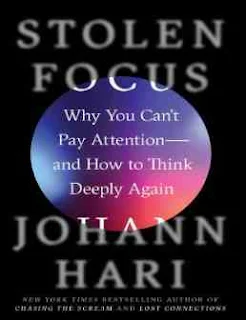Stolen Focus: Why You Can't Pay Attention--and How to Think Deeply Again
This is among the better analyses I've read on attention across personal, societal, and physiological concerns. explores issues including food, stress, sleep, and pollution rather than just the obvious. Although I disagree with the author's interpretation of some of these points, the presentation's underlying logic is excellent.
Some quotes from the book
Similarly, when you set up (say) a Facebook account, it could ask youhow much time you want to spend per day or per week on the site. Youmight name ten minutes, or two hours—it’s up to you—and then thewebsite could help you to achieve your goal
After studying all the hidden data—the stuff that Facebook doesn’trelease to the public—the company’s scientists reached a definiteconclusion. They wrote: “Our algorithms exploit the human brain’sattraction to divisiveness,” and “if left unchecked,” the site wouldcontinue to pump its users with “more and more divisive content in aneffort to gain user attention and increase time on the platform.”
There are real steps you can take as an isolated individual to reducethis problem for yourself, and throughout this book you’ll learn how tocarry them out. I am strongly in favour of you seizing personalresponsibility in this way. But I have to be honest with you, in a way that Ifear previous books on this topic were not
